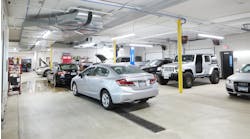When most people think of the Nordstrom department store, they don’t think automotive. But that’s exactly why Ken Price, president of Washington-based Westbay Auto Parts, Inc., brings up the comparison.
“Wholesale business tends to drive the quality of parts we stock. We are the ‘Nordstrom’ of auto parts,” he explains. “Nordstrom is known for quality and service. Our customers are coming to us for a reason. They want a quality part. They want something that will last. Having that mindset dictates what we stock. They know quality. And the service level that Nordstrom provides is what we want to provide to our customers.”
Most businesses will tell you that quality parts and customer service are what has made them successful. But Westbay Auto Parts’ commitment to their customers extends into every aspect of their business. They don’t just service their customers; Westbay acts as a partner for their customers’ success.
Dave Anderson, sales manager with Westbay Auto Parts, works directly with wholesale customers on various programs and addresses their issues. He understands that Westbay’s growth is limited by the growth of their customers.
“Our focus is on how to make the customer more profitable. We work with them on education for operating their businesses. Most of the people in our industry didn’t come into it with any financial training. We stumbled into our jobs. And learning the financial aspect has come to all of us after the fact,” Anderson says.
Westbay, in conjunction with Parts Plus University, runs classes to train their customers in a year-long program.
Anderson says they typically have a decent size group, but he’d like to see more customers take advantage of the opportunity. He understands firsthand what goes into the classes and what the customers can get out of them — Anderson oversees the company’s machine shops and has gone through the training himself.
“I took the training just like our customers. I was trying to view our machine shops like installer facilities. It was very eye-opening. What I learned, I can now pass on from a more empathetic perspective. When the numbers aren’t what you want to see, I know what that feels like. It helps me sell the concept to my customers.”
The company also hosts an installer show every other year for all wholesale-type businesses — including body shops, repair shops and dealerships — and it typically has at least 1,000 people in attendance.
This attitude and perspective has helped Westbay not only educate their customers, but themselves too. The products the company stocks, the events they run and the services they provide all directly relate back to what is in the best interests of the customer.
Westbay’s inventory is varied and they look primarily to their wholesale customers when deciding which parts to stock. They don’t specialize in any particular niche, but Price says the main focus is hard parts — brakes, filters, ignition and electrical items are top sellers — and then accessories. The company also takes a customer-centric approach when it comes to recouping its lost sales.
“It’s kind of antiquated, actually,” Price says. “We don’t do it in the computer. It’s all done on a form. That way it’s done quickly. We track the part number and application. Once the form is full, we review lost sales. It’s done consistently throughout the year and we try to immediately react to inventory demands.”
Westbay is familiar with those demands, and getting the right part to the customer is the primary goal. The company opts to be a three-step distributor in everything, but has a pricing structure that allows them to compete with two-step distributors.
“If we are self supplied, we can only tell you what we have in stock, not what is needed to get the car back on the road. As a three-step distributor, we have various suppliers that allow us to find the part. Our goal is to make one call to get the job done. We consider ourselves a true jobber. And we have to take a step beyond our competitors. We feel the pain of what it costs to do a warranty when a part fails. If a part fails, we try to get that customer taken care of,” adds Anderson.
Westbay became affiliated with Parts Plus in the early 1990s. “To bring that service and availability to our customers, we wanted national recognition. Parts Plus (which recently merged with the International Auto Parts Alliance to form the Automotive Distribution Network) brings a lot to the table. We can buy better, have advertising programs and nationwide warranty, which is important in this area. We have a lot of military here — a large transient population — and if they buy from us and then move, all they have to do is go to another Parts Plus store if they have a problem or need something,” comments Price.
Despite the affiliation with Parts Plus, Westbay is still seen as an independent in the community.
“We are a locally-owned company: family run. It’s pretty evident that we’re still viewed in the community as Westbay Auto Parts. We get the benefits of a buying group, but still get to be independent.”
A critical key to Westbay’s relationship with its customers is its staff. The company cannot truly act as a partner to its customers if the people are not there to back up that commitment.
“We have six or seven people celebrating 20 years with us. The vast majority has been here for 10 or more. If I can get someone to stay for two years, we typically have them forever,” Price jokes.
And Westbay makes an investment in its future and the future of the industry. The company offers a scholarship program for high school students pursuing vocational studies. They are also involved in high school auto shop programs and the auto program at local Olympic College — all in an effort to keep the talent coming and to groom the next generation.
In the end, however, customers are what make a company successful. And it’s a testament to Westbay’s service and outlook on business that the employees know their customers by name, some of which began buying there in the 1960s. Having those strong bonds is invaluable for further growth and success. Nordstrom would likely agree.



